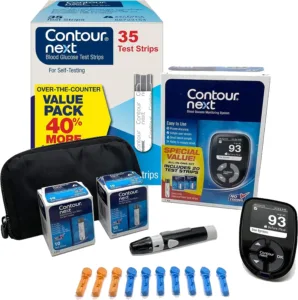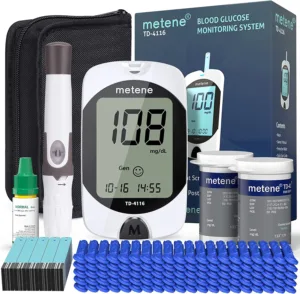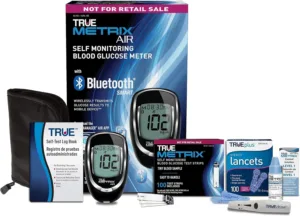
Living with diabetes requires careful monitoring and management of blood glucose levels. A glucose meter is an essential tool for individuals with diabetes, as it allows them to measure their blood sugar levels conveniently and accurately. However, with so many options available in the market, choosing the right glucose meter can be overwhelming. In this comprehensive guide, we will help you understand the importance of a glucose meter, explore different types of glucose meters, discuss key factors to consider when choosing one, review top glucose meter brands, and ultimately assist you in making the right decision for your needs.
Top 3 Best Glucose Meters To Monitor Your Blood Sugar
- CONTOUR NEXT Blood Glucose Monitoring System. Ensure accurate diabetes management with our glucose monitor, featuring personalized hi/lo target ranges and a comprehensive summary of test results. Experience fast testing with a 5-second countdown, providing 7, 14, and 30 day averages for convenient daily monitoring. Benefit from second-chance sampling, allowing additional blood application within 30 seconds, reducing potential test strip wastage, and saving costs. Ready to use out of the box, our glucose monitor simplifies daily testing and enhances efficiency in managing your diabetes.
 CONTOUR NEXT Blood Glucose Monitoring System
CONTOUR NEXT Blood Glucose Monitoring System
- TRUE Metrix AIR Starter Kit. Experience seamless connectivity with Bluetooth Smart technology in our glucose monitor. With no coding required, obtain results in as fast as 4 seconds using a tiny 0.5 microliter sample size. Stay on track with 4 testing reminder alarms, and conveniently download your data for comprehensive monitoring capabilities. Our glucose monitor combines speed, accuracy, and smart features to enhance your diabetes management experience.
- Metene TD-4116 Blood Glucose Monitor Kit. Equipped with advanced technologies, delivers accurate and reliable results for effective blood sugar control. With a code-free design, it’s ready for testing upon strip insertion, and a quick guide inside the package ensures easy operation. The monitor requires only 0.7 microliter of blood and provides results in just 7 seconds, minimizing discomfort. Track your glucose trend with 4 recording modes and store up to 450 values for convenient diabetes management. User-friendly features include 4 reminder alarms for timely testing, making it ideal for the elderly, and a larger display for easy reading. We also provide instructional videos for any operational queries.
 Metene TD-4116 Blood Glucose Monitor Kit
Metene TD-4116 Blood Glucose Monitor Kit
Understanding the Importance of a Glucose Meter
Monitoring your blood glucose levels is crucial for effective diabetes management. By regularly checking your levels, you can make informed decisions about your diet, medication, and lifestyle choices. A glucose meter provides you with real-time data, enabling you to take immediate actions to keep your blood sugar within a healthy range.
But why is it so important to have a glucose meter? Let’s delve deeper into the topic.
Living with diabetes means constantly managing your blood sugar levels. It’s a delicate balance that requires careful attention. Without a glucose meter, you would be left in the dark, unaware of how your body is responding to various factors.
Imagine this scenario: you’ve just finished a meal that you thought was healthy, but shortly after, you start feeling sluggish and fatigued. Is it a normal post-meal slump, or is your blood sugar spiking? Without a glucose meter, you wouldn’t know for sure.
With a glucose meter, you can take control of your health. By regularly monitoring your blood sugar levels, you can identify patterns and trends that may affect your overall well-being. This knowledge empowers you to make informed decisions about your lifestyle and treatment plan.
The Role of Glucose Meters in Diabetes Management
Glucose meters play a vital role in diabetes management by providing accurate and timely information about your blood glucose levels. They allow you to track trends over time and identify patterns that may impact your overall well-being. By understanding how specific foods, physical activities, and medications affect your blood sugar, you can adjust your treatment plan accordingly.
Let’s take a closer look at the benefits of using a glucose meter:
- Accurate Readings: Glucose meters are designed to provide accurate readings consistently. This reliability is crucial for making informed decisions about your diabetes management. Look for models that are FDA approved and have undergone rigorous testing to ensure accuracy.
- Real-Time Data: With a glucose meter, you can access real-time data about your blood sugar levels. This immediate feedback allows you to take prompt action to keep your blood sugar within a healthy range. Whether it’s adjusting your diet, taking medication, or engaging in physical activity, you can make informed choices based on the data provided by your glucose meter.
- Trend Analysis: By regularly monitoring your blood sugar levels, you can track trends over time. This long-term data can reveal patterns that may impact your overall well-being. For example, you may notice that your blood sugar tends to spike after consuming certain foods. Armed with this knowledge, you can make adjustments to your diet and manage your diabetes more effectively.
- Personalized Treatment: Every individual with diabetes is unique, and what works for one person may not work for another. A glucose meter allows you to personalize your treatment plan based on your specific needs. By understanding how your body responds to different factors, such as food, exercise, and medication, you can make adjustments that optimize your diabetes management.
Key Features to Look for in a Glucose Meter
When choosing a glucose meter, it’s important to consider certain key features that can significantly impact its functionality and usability:
- Accuracy: Look for a meter that provides accurate readings consistently. Consider models that are FDA approved and have undergone rigorous testing. Accuracy is crucial for making informed decisions about your diabetes management.
- Ease of Use and Convenience: Opt for a meter that is user-friendly, with clear instructions and a simple interface. Features like large display screens, backlighting, and audio prompts can enhance usability, especially for individuals with visual impairments.
- Cost and Insurance Coverage: Evaluate the cost of test strips, lancets, and other necessary supplies. Check with your insurance provider to determine if your chosen glucose meter is covered. It’s important to consider the long-term affordability of using a specific meter.
- Data Management: Some glucose meters offer advanced data management features, allowing you to store and analyze your blood sugar readings over time. This can be incredibly helpful in managing your diabetes effectively and identifying trends. Consider if this is something that would benefit you in your diabetes management journey.
By considering these key features, you can choose a glucose meter that meets your specific needs and enhances your diabetes management efforts.
Different Types of Glucose Meters
Glucose meters come in various types, each with its own advantages and disadvantages. Let’s explore the two main types:
Self-Monitoring Blood Glucose Meters
Self-monitoring blood glucose meters are the most commonly used type of glucose meter. They require a small blood sample, usually obtained by pricking your fingertip with a lancet, and provide instant results. These meters are portable and convenient, allowing you to check your blood sugar levels anywhere, anytime.
One of the key advantages of self-monitoring blood glucose meters is their simplicity. With just a small blood sample and a few seconds of your time, you can get an accurate reading of your blood sugar levels. This makes them ideal for daily monitoring and for people who need to keep a close eye on their glucose levels.
Another advantage of self-monitoring blood glucose meters is their affordability. These meters are widely available and come in a range of prices, making them accessible to people with different budgets. Additionally, the test strips used with these meters are often covered by insurance, further reducing the cost for many individuals.
However, self-monitoring blood glucose meters do have some limitations. The need for regular finger pricks can be uncomfortable and inconvenient for some people, especially those with sensitive skin or a fear of needles. Additionally, these meters provide a snapshot of your glucose levels at a specific moment in time, rather than a continuous stream of data.
Continuous Glucose Monitoring Systems
Continuous glucose monitoring (CGM) systems offer a more comprehensive approach to managing diabetes. These systems use a small sensor inserted under the skin to continuously measure glucose levels. The sensor transmits data wirelessly to a receiver or smartphone app, providing real-time glucose readings and trends. CGM systems are particularly beneficial for people who require intensive glucose monitoring, such as those with type 1 diabetes or those on insulin therapy.
One of the main advantages of continuous glucose monitoring systems is the ability to track glucose levels throughout the day and night. This continuous stream of data allows for a more detailed understanding of how different factors, such as food, exercise, and medication, affect blood sugar levels. By identifying patterns and trends, individuals can make more informed decisions about their diabetes management.
Another advantage of CGM systems is the ability to receive alerts and notifications when glucose levels are too high or too low. This can be especially useful for individuals who have difficulty recognizing the symptoms of hypoglycemia or hyperglycemia. The real-time feedback provided by CGM systems can help prevent dangerous blood sugar fluctuations and improve overall diabetes control.
However, it’s important to note that continuous glucose monitoring systems also have some limitations. The sensors used in these systems need to be replaced every few days, which can be costly and require regular maintenance. Additionally, the accuracy of CGM systems can be affected by factors such as sensor calibration, site location, and interstitial fluid lag time.
Factors to Consider When Choosing a Glucose Meter
When selecting a glucose meter that best suits your needs, consider the following factors:
Accuracy of the Meter
Accuracy is of utmost importance when it comes to monitoring your blood glucose levels. It is crucial to have a reliable and precise glucose meter that provides accurate readings. Look for meters that have been clinically validated and have a high degree of accuracy. These meters have undergone rigorous testing to ensure their reliability. Reading customer reviews and consulting with healthcare professionals can also help you gather information about the accuracy of various models.
Moreover, it is important to note that accuracy can be affected by factors such as temperature, humidity, and altitude. Some glucose meters have built-in features to compensate for these variables, providing even more accurate results.
Ease of Use and Convenience
A user-friendly glucose meter can make a significant difference in your daily diabetes management routine. When considering ease of use and convenience, there are several features to keep in mind.
Firstly, look for a meter with a large and easy-to-read display. This ensures that you can easily see and interpret your blood glucose readings, especially if you have visual impairments or struggle with small text. Additionally, backlighting is a useful feature for low-light situations, such as testing your blood glucose levels at night.
Furthermore, consider the meter’s navigational features. A meter with intuitive menus and easy navigation allows for quick and hassle-free access to various functions. Being able to easily access previous readings and track your glucose levels over time can be beneficial for monitoring your diabetes management progress.
Portability is another factor to consider. Think about the size and weight of the meter, as well as its overall design. A compact and lightweight meter can be more convenient to carry with you wherever you go. Additionally, consider the simplicity of changing batteries or charging the device. Some meters have rechargeable batteries or USB charging options, which can be more convenient and cost-effective in the long run.
Cost and Insurance Coverage
Understanding the cost of the glucose meter itself, along with the ongoing cost of test strips and other supplies, is essential for long-term management of your diabetes. Different glucose meters vary in price, so it’s important to consider your budget and the affordability of the meter and its associated supplies.
Additionally, check with your insurance provider to see if the glucose meter you’re considering is covered under your plan. Some insurance plans may have specific coverage for certain brands or models of glucose meters. Understanding your insurance coverage can help you make an informed decision and potentially save on out-of-pocket expenses.
It’s also worth considering the availability and cost of test strips for the glucose meter. Test strips are an ongoing expense, as they need to be replaced regularly. Research the cost of test strips for the meter you’re considering and ensure that they are readily available in your area.
By considering the factors mentioned above, you can make a well-informed decision when choosing a glucose meter that best fits your needs and preferences. Remember to consult with your healthcare professional for personalized advice and recommendations tailored to your specific situation.
Making the Final Decision: Which Glucose Meter is Right for You?
Choosing the right glucose meter is a highly personal decision that should consider your unique needs and preferences. Here are some factors to consider when making your final decision:
Personalizing Your Choice Based on Lifestyle and Needs
Consider your lifestyle and how a glucose meter fits into your daily routine. If you’re always on the go, a compact and portable meter may be a better choice. If you prefer advanced data management, look for a glucose meter that offers these features. Ultimately, select a meter that aligns with your individual preferences and will encourage consistent monitoring of your blood sugar levels.
Consulting with Your Healthcare Provider
Your healthcare provider is an invaluable resource in guiding your decision about the most suitable glucose meter for you. They can provide personalized recommendations based on your specific medical condition, lifestyle, and treatment goals. Consulting with your healthcare provider ensures that you make an informed decision and receive the necessary support to effectively manage your diabetes.
Selecting the right glucose meter is crucial for effective diabetes management. Consider factors such as accuracy, ease of use, cost, and insurance coverage when evaluating different models. Review top brands and their respective pros and cons to find the glucose meter that suits your specific needs. Personalize your choice based on your lifestyle and consult with your healthcare provider for expert guidance. With the right glucose meter in hand, you can confidently monitor your blood sugar levels and take control of your health.
Enhance Your Diabetes Management with The CareClinic App
This comprehensive app complements your chosen glucose meter by allowing you to track your blood sugar levels, monitor trends, and log medication intake. With features such as reminders for medication and test strip reordering, personalized health reports, and the ability to share data with your healthcare provider, the CareClinic App is designed to support you in achieving improved health outcomes. Experience the convenience of having all your diabetes management tools in one place. Install the CareClinic App today and take the next step towards a healthier, more informed lifestyle.

 TRUE Metrix AIR Starter Kit
TRUE Metrix AIR Starter Kit
